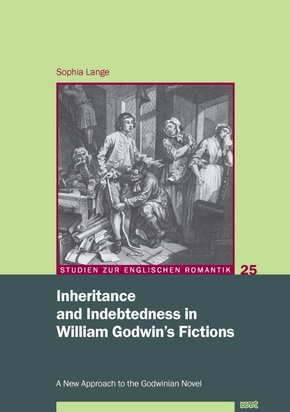Inheritance and Indebtedness in William Godwin's Fictions - A New Approach to the Godwinian Novel
| Verlag | WVT Wissenschaftlicher Verlag Trier |
| Auflage | 2025 |
| Seiten | 202 |
| Format | 15,0 x 1,0 x 21,1 cm |
| Gewicht | 300 g |
| Artikeltyp | Englisches Buch |
| Reihe | Studien zur Englischen Romantik 25 |
| ISBN-10 | 3989400738 |
| EAN | 9783989400733 |
| Bestell-Nr | 98940073A |
In his Enquiry Concerning Political Justice (1793), published only a few days after the guillotining of King Louis XVI of France, English philosopher and political thinker William Godwin openly criticises oppressive governments that inhibit social progress by suppressing rational discourse and morality. While Political Justice shaped the Revolution Debate of the 1790s, Godwin's texts, and especially the novels published after his stellar success Caleb Williams, often remain overlooked despite their innovative fusions of fact and fiction. Located at the crossroads of history and literary imagination, Godwin's novels present fictional case studies grounded in both the realities of the novels' settings and the philosopher's contemporary Britain, which offer powerful commentary on the pressures exerted over citizens in systems of patriarchal oppression.
This work makes a significant contribution to scholarship on William Godwin, especially by paying serious attention to his hither to neglected later novels. Focusing on the period between 1790 and 1830, the book investigates economic relations, property rights, proto-feminist thought, and individual and collective trauma in Godwin's writings. Generational, gender-based, and socio-economic hierarchies are interpreted as relationships of inheritance and indebtedness which shed light on the specific 'structures of feeling' that emerge in both the author's and his narrators' socio-political, historical, and material realities. By offering new close readings of his fictional oeuvre, the book contributes to our understanding of Godwin's later novels after Caleb Williams (1794), demonstrating how his political philosophy was shaped by his own life events in its discussion of the relationship between individual character and social circumstances. The modern progressivity of Godwin's novels, namely the political potential of constructing novel reading as interventionist practice, is highlighted throughout.
TABLE OF CONTENTS
1.Introduction: William Godwin. Radical Philosopher and Revolutionary Writer 1
1.1 Biographical Sketch 5
1.2 The Enduring Reputation of William Godwin's Political Thought 12
1.3 Terminology 14
1.3.1 Defining Inheritance 14
1.3.2 Defining Debt 16
1.3.3 Defining Indebtedness 18
2. Cultural Materialism and the Novel 20
3. Defining the Godwinian Novel 25
3.1 Caleb Williams and 'Things as They Were' in the 1790s 26
3.2 Beyond Caleb Williams: Confessional Narratives of Propertied Anti-Heroes 34
3.3 Towards a Collective Understanding of Truths 39
4. Inheritance and Indebtedness in the Godwinian Novel 45
4.1 Silencing Inheritance and Indebtedness as Absolute Exclusion in St Leon (1799) 48
4.1.1 Economic Value Sy stems in the 1790s in Britain 51
4.1.2 Configurations of Inheritance and Indebtedness in St. Leon 56
4.2 Binding Inheritance and Indebtedness as Sentimental Shackles in Fleetwood (1805) 76
4.2.1 Reading Fleetwood as Sentimental Bildungsroman 77
4.2.2 Configurations of Inheritance and Indebtedness in Fleetwood 83
4.2.3 Echoes of Sentimental Ties in Godwin's Present 98
4.3 Traumatic Inheritance and Indebtedness as Mental Enclosure in Mandeville (1817) 101
4.3.1 William Godwin's Personal and Political Entanglements in the 1810s 101
4.3.2 A Tale of Irish Rebellion and English Rejection 103
4.3.3 Configurations of Inheritance and Indebtedness in Mandeville 105
4.4 Threatening Inheritance and Indebtedness as Annihilating Force in Cloudesley (1830) 120
4.4.1 Frame Narrative: Abusiv

